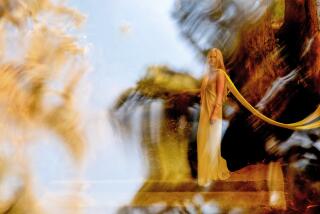Review: ‘The Nightmare’ seems more thin mood piece than documentary
- Share via
There’s a reason Rodney Ascher’s documentary is called “The Nightmare” as opposed to, say, “Nightmares.” That’s because his eight interviewees, who were filmed separately and do not know one another, all endure a version of the same wretched sleep vision: an inability to move, terrifying sounds and “shadow men” closing in.
Known as sleep paralysis, the condition — as presented by Ascher through his subjects’ accounts, narrated to atmospheric dramatizations befitting a modern horror movie — sounds excruciating, and it seems guaranteed to alter its sufferers’ perceptions of existence. (One young woman, dismissive of scientific explanations, turned to Christianity as a result.)
Ascher has fared well tapping into collected perceptions and insight: His last film, “Room 237,” memorably cataloged a few movie buffs’ differing analyses of Stanley Kubrick’s “The Shining.” The power of cinema’s power over our consciousness was addressed here too.
But while the men and women of “The Nightmare” earn our sympathy for actually living a scare flick whenever they shut their eyes, Ascher is too content to let repetition of experience take over his film. No sleep studiers or brain experts or anybody else, for that matter, are interviewed. Even the stylish re-creations turn monotonous, which renders “The Nightmare” a thin mood piece at best.
“The Nightmare.” No MPAA rating. Running time: 1 hour, 31 minutes. Playing: Laemmle’s NoHo 7, North Hollywood.
More to Read
Only good movies
Get the Indie Focus newsletter, Mark Olsen's weekly guide to the world of cinema.
You may occasionally receive promotional content from the Los Angeles Times.









